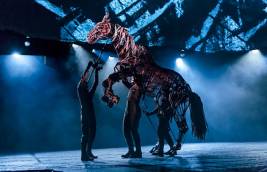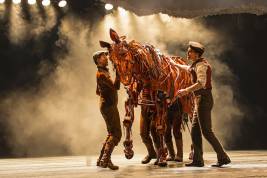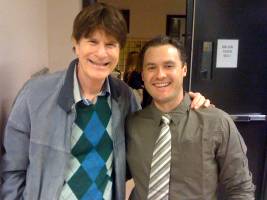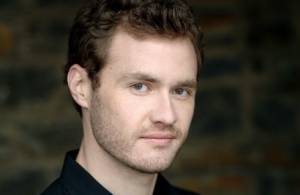The Broadway blockbuster War Horse’s upcoming stop at Costa Mesa’s Segerstrom Center For The Arts marks a return home for Brian Robert Burns, the talented Yale MFA grad who occupies the mid-section of lead stallion Joey, one of several roles, equine and human, that the Orange County native brings to life in the smash international hit’s North American Tour. StageSceneLA was fortunate enough to catch up with Brian as he was getting ready for his first production in the OC since graduating from Cal State Long Beach. Here’s our interview:
Brian, how does it feel to be performing on your home turf?
It feels like a dream come true. The last time I was in a show this close to home was at the Newport Theatre Arts Center where I played Tom in a production of The Young Man From Atlanta directed by Phyllis Gitlin. It’s really a wonderful thing to come home because it’s such a sacrifice to be away from family and friends in order to pursue my career. Now I get to share with all of my loved ones this thing that I do and love doing and with which I identify. It’s just as much of a rebirth as a homecoming in a way. Twelve years ago, I started acting at Orange Coast College—in this very city. It’s where I started to dream big and this is a realization of that dream.
Growing up in the OC, how did you first become interested in theater?
I started acting at Orange Coast College because my uncle Brian suggested that I take an acting class after I admitted to him I wanted to be a rock star. I had been at OCC for three semesters, trying to find out what I wanted to do with my life, and I decided to take a guitar class because it was something I always wanted to do. Having done that, I loved it and I wanted to pursue it, and I was opened up to other pursuits as well, so when my uncle suggested I take an acting class, I was already open to saying yes to new things. The day of my first acting class, I got to the theater a little early and there were about five or six people there. I sat down and looked around for a second and I knew that was where I was supposed to be. I thought to myself, “This is it. This is what I’m going to do for the rest of my life.” I’m very fortunate to have the opportunity to make that dream come true thus far. Because I was a couple of years behind schedule, I focused on theater within my academic schedule so I could graduate and move forward as quickly as I could. The only experience that I have with theater in Orange County outside of academia is, again, at the Newport Theatre Arts Center.
I understand that you got your Bachelors at Cal State Long Beach. Was it soon after that that you made the move back east?
There was a series of things that fell into place. Hugh O’Gorman is the head of acting there and he suggested I audition for Jed Diamond who was auditioning for a six-week summer program in New York at The Actors Center. I explained that I couldn’t afford it and Hugh told me to just audition and worry about it later. So I did and I got in. When I told my father that the audition went well but that I knew I couldn’t go, he told me “Brian, if you get in, you have to go. We’ll figure it out. You have to follow your dream.” So, I went. I loved it and from there Jed suggested that I go to graduate school and I said to him “People go to graduate school for this?!” He chuckled at my naiveté and gave me courage to pursue such an endeavor. I then auditioned for grad schools and got into Yale.
What prompted the decision to make New York your new home?
Three years later, when I was thinking about L.A. or New York, there wasn’t even a question. My training was in theater, my heart was in theater and I knew that first step was East. Because Southern California is my home, I knew I would return there eventually, but I knew I had to take on the world. I just knew that I had a lot more to do and a lot more places to see before I head back to California.
MFA programs don’t get any more prestigious than Yale School Of Drama. Looking back at your studies there, how did this additional training prepare you for your current career?
It’s really an honor to be a part of such a wonderful establishment. The Yale staff really teaches you how to stretch and flex your abilities. The training there is truly exceptional. Most importantly, though, I feel that the work there grounded me in my sense of who I am and what kind of actor I want to be. Those three years trained me for a relentless pursuit of an imaginative life, gave me a work ethic, and taught me of what I was capable.
Of all the productions you performed in before War Horse, are there any that particularly stand out in your memory?
Of course! They each have a memory, a sense, attached to them. I remember them all, from my first student show at OCC called The Window Of Darkness, to the epic adventure of Pericles at Yale, to Look Back In Anger at the Richmond Shepard Theatre. There’s just so much I could say… I suppose the greatest impact theater has had on me is the way that it has enriched my life with tremendous individuals, in pursuit of an art, living with vigor. I have found a home here, a tribe, in the life of the theater to which each show has contributed. For that, I am endlessly grateful.
Had you seen War Horse before auditioning, or maybe before even imagining that it might be in your future?
I hadn’t seen it before I auditioned because New York is expensive and unfortunately, living expenses had to take priority over extracurricular activities. Thankfully, there were some videos online that I could look at to get a sense of what I was doing.
What was your reaction the first time you saw it onstage?
We were already in rehearsals when I finally got to see the show. I was overwhelmed. Seeing the show live and breathe as I was learning to make it live and breathe was a powerful experience. Also, I had some classmates both from Yale and CSULB in the Broadway production, so I was also feeling very proud of them. It was truly a celebration in a lot of ways.
 Was there anything in your previous acting experience that prepared you for being hidden inside the mid-section of a life-sized horse?
Was there anything in your previous acting experience that prepared you for being hidden inside the mid-section of a life-sized horse?
Absolutely not. There are a lot of parallels to my training in clown, movement or mask—even basic acting—that I draw from consistently, but absolutely nothing can prepare you for being in the horse. It’s such a particular skill. Viscerally, it’s a tremendous experience. I remember after each of the auditions I had to go for at least an hour walk in central park to get reoriented. It may sound silly, but it’s true. It’s a completely different body and head space that you live in when you are in horse.
Besides all the research that clearly went into creating Joey, can you talk about your mindset when performing inside a horse?
It is a challenge to bring a character to life with two other people. Every person has input and all of you have to work together. Not to mention, you are all also physically attached to each other through the puppet. You have to listen, you have to stay open to suggestion, and you have to let your imagination run. It’s particular as well, because you can’t just go crazy. You have to take care of each other. You have to bring everyone with you including those with whom you are “in horse,” to the other cast members on stage and on out to the audience—everything must be clearly communicated.
Has Joey changed at all over the time that you’ve been helping to create him?
There are things that are set, or have been determined through previous inspiration or deliberate blocking, but there is always something new. There is always the breath of inspiration in getting from point A to point B, and that is what keeps the horses truly alive. Joey, Topthorn, and all the puppets have grown so much in our time on tour and that is attributed to the tireless will and inspiration of our many talented puppeteers, cast members and the creative team working together in service of this tremendous theatrical event.
You also appear as Topthorn, Coco, John Greig in War Horse. Can you talk a bit about these other characters? I’m assuming John Grieg is a human character. What about the others?
Topthorn is a beautiful specimen of a war horse, well trained and dignified. Powerful, graceful and brave. Coco is one of the tragedies of the play because by the time Coco is introduced, this poor horse has been taken over by the events of the play. Technically, the two horses differ greatly. Topthorn has a much longer, leaner chassis and his legs are longer, making him taller. Coco is a smaller, clumsier horse with a broken spirit.
And John Grieg?
I’m very happy to have the opportunity to play John Greig because it affords me the opportunity to plug back in to the traditional sense of acting with which I first fell in love. He’s a bet maker and a risk taker with a fun, light heart and a great spirit.
War Horse has the distinction of being the only non-musical on a 2013 slate that includes upcoming Segerstrom productions of Wicked, Billy Elliott, and Flashdance. What is it about this play that makes it “fit in” with a more traditionally “Broadway Show” season?
I think the scope of the play affords it the ability to reach people. It’s quite the theatrical event with many elements of this show—live music, singing, puppetry, a spectacular soundscape, exceptional projections—that make it special. The traditional and the nontraditional elements of this play working together I think is what allows it to have the impact that we witness it having with audiences around the nation every night.
 Are there things you can do (or emotions you can stir up) onstage that living, breathing horses couldn’t do in the Steven Spielberg film?
Are there things you can do (or emotions you can stir up) onstage that living, breathing horses couldn’t do in the Steven Spielberg film?
Our puppeteer directors Adrian and Basil have ingrained in our brains that the event of puppetry is making the puppet live and breathe. For that to happen, the audience has to engage in a way that they wouldn’t normally. Everyone is involved, invested, in the life of these puppets and I believe it is that investment that affords such a tremendous response. The experience of theater vs. cinema is particular, and I think that the immediacy of the theatrical exchange and the reciprocal nature of that exchange also contributes to the very special experience of our show.
You’ve got one webseries in the can and another in development. How do you enjoy acting for the camera as opposed to stage acting?
I’ll admit, my endeavors on screen are modest, but I cannot deny its appeal. I love being on camera. I think it’s a fantastic medium with incredible expressive capability. I’d be lying if I said i didn’t want to balance a theatrical career with that of film and television, however, I’ve never been particular about how I work. I don’t really care what the medium is, as long as I get to pursue and fulfill the passion i have for this art in all of its disciplines. I want to live my life in the vein of this thing and have it be the vehicle for meeting new people, seeing new places, and having new experiences. I’m very fortunate to be able to say that I am currently doing that. I love what I do and I don’t want to stop. Ever.
One last question. Do you have any dream role (or roles) that you can’t wait to play someday?
For theater? Hamlet, Romeo, and Henry V. I’d also like to revisit Pericles, Pale from ‘Burn This’ and ‘Troilus and Cressida’. I played Cressida in an all-male production but I’d like to play Troilus. Also, if I ever find myself in a baseball, football, action, or war film, I might explode from excitement.
Thanks so much, Brian. I’m looking forward to seeing you in War Horse on Opening Night!
Brian’s War Horse bio: New York: HERE Arts Center, Richmond Shepard Theatre, Abingdon Theatre, East 13th Street Theatre and Ars Nova. Regional: San Francisco Playhouse, Newport Theatre Arts Center, Edison Theatre and Yale Repertory Theatre. Vladislav in the webseries Shakespeare, Hashish and Ish,Dan in the developing webseries Megans Bridge. MFA Yale School of Drama.
War Horse photos: Brinkhoff/Mögenburg

Thank you Brian for the great backstage tour!!
Purchase tickets for War Horse at the Segerstrom Center For The Arts



 Since 2007, Steven Stanley's StageSceneLA.com has spotlighted the best in Southern California theater via reviews, interviews, and its annual StageSceneLA Scenies.
Since 2007, Steven Stanley's StageSceneLA.com has spotlighted the best in Southern California theater via reviews, interviews, and its annual StageSceneLA Scenies.







 COPYRIGHT 2025 STEVEN STANLEY :: DESIGN BY
COPYRIGHT 2025 STEVEN STANLEY :: DESIGN BY